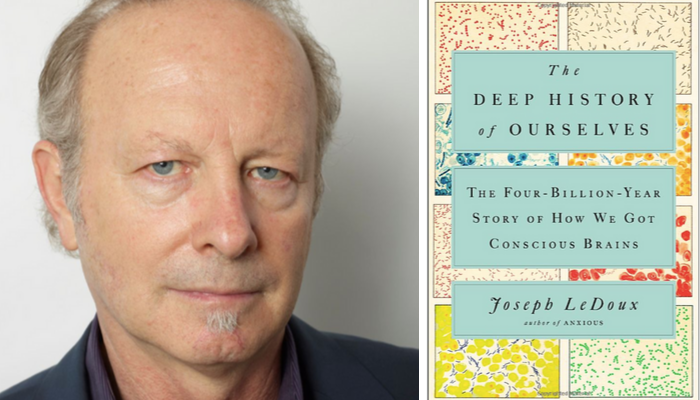Joseph LeDoux is a Professor of Neural Science and Psychology at NYU. A neuroscientist who has spent the last thirty years studying the brain mechanisms of fear and emotional memory, he’s published several books on those topics, including The Emotional Brain, Anxious: Using the Brain to Understand and Treat Fear and Anxiety, and most recently, The Deep History of Ourselves: The Four-Billion-Year Story of How We Got Conscious Brains. LeDoux also moonlights as the main songwriter and guitarist for the neuroscience rock band aptly named The Amygdaloids (!).
I spoke with LeDoux ahead of his talk tonight on the evolution of the nervous system, negative emotions, and how to treat anxiety and fear disorders…
Your new book The Deep History of Ourselves talks about the evolution of the nervous system. What are some of the most surprising findings you discovered during your research on how the nervous system has evolved in animals and humans?
The most interesting thing was how far back in evolution the ability to detect and respond to danger goes. It seems that the first cells that ever lived long enough to reproduce and evolve over time had to be able to detect danger, otherwise they would not have lived through the day. Life is a dangerous undertaking.
Can we artificially add a negative memory into someone’s brain in order to help them overcome addictions, for example?
Theoretically this is possible. Lab studies, especially in rodents, show how behaviors can be affected like this. But it has been harder to demonstrate in humans. Our brains, and ways of encoding memory, is much more complex. Research is ongoing. If successful, obvious ethical issues would arise about how this might be abused. But that is always the case with things that affect our minds and behaviors.
Your work involves developing novel approaches to the treatment of fear and anxiety disorders. But do fear and anxiety have evolutionary advantages? When should they be treated, and when should they be left alone?
The ability to detect and respond to danger is present in every organism that ever lived. Fear and anxiety, as we humans know these, may well be ours alone. We don’t know what other animals experience. But if they do, whatever they experience has to be different from what we experience in our lives because circuits in the human brain that seem to be doing this have some unique properties lacking in other animals, including other primates.
What are your thoughts on the mind-body connection, specifically how anxiety can lead to physical manifestation of pain (eg. back pain, headaches, etc.)?
One answer is that anxiety has widespread top down effects (direct or indirect) on the brain and body, altering processes that affect sensory processing and cognitive processes as well. Another answer is that part of pain is what is on your mind. Pain is not noticed when you laugh at a joke. To the extent that anxiety is worry, mentally focusing on pain is the opposite of distraction–it becomes what you are noticing in your mind.
As a fellow New Yorker, what are some of the coolest spots in NYC that you like to visit?
The dwindling East Village music clubs have long been a favorite of mine. Very few are left, but life is change. I live in Williamsburg and have become an avid fan of National Sawdust, a very new kind of music place that everyone should know about, regardless of their musical style preference. I also like the small independent bookstores in Williamsburg– Spoonbill, McNally Jackson, and Book Thug (used books).
Meet Joseph LeDoux at the Rubin Museum tonight for a talk on The Power of a Single Cell: The Deep History of Ourselves. Details here.


